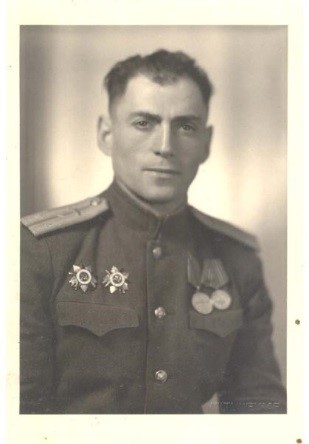Khayim Goldberg was born in 1914 in Borisov, Belorussia. His father Moisei (Moishe), a dyer, had moved to Borisov from Ukraine long before World War I. Khayim grew in the multi-ethnic milieu of pre-World War II Borisov, acquiring fluency in four languages: Yiddish, Belorussian, Polish, and Russian. In 1919, the 5-year-old Khayim was sent to a kheyder, where he was instructed in a fifth language, Hebrew. For the rest of his life, despite not being religious, Goldberg would remain grateful to the local rabbi, who taught his pupils the ethical foundations of life, and to the kheyder:
"I am grateful to the kheyder. I have never used Hebrew in my life, and I quickly forgot it, but the excellent memory training that I had received there served me in good stead when I learned Latin and other required foreign languages". 1
At the age of 8, Khayim was sent to a Russian-language school. While studying there, he stopped attending the synagogue and observing Jewish traditions.
After seven years of schooling, Khayim worked as an apprentice blacksmith, and then at the town's power station. In 1937-39, he served in the Red Army. After his discharge, he went to Moscow and enrolled in the Faculty of History of the Moscow Pedagogical Institute.
With the beginning of the Soviet-German war, Khayim Goldberg volunteered for a militia battalion that was to take part in the defense of the capital city. From the militia, he, as a former student of history and Party member, was sent to the Artillery and Tank Department of the Military Political Academy, which had been recently evacuated to the Urals. In May 1942, having completed a shortened course, Lieutenant Goldberg was transferred to the Political Administration of the Central Front. From there, he was sent to a tank academy. In July 1943, Khayim Goldberg returned to the Central Front and, as the commander of a tank –later of a tank platoon – he took part in the Kursk Salient operation. Later, when the Central Front was renamed the 1st Belorussian Front, he was appointed the commander of the communications platoon of the staff of the 36th Tank Brigade. In this capacity, he repeatedly engaged in tank combat against the enemy. He received three military awards for combat: the "For Courage" medal – for his actions in Western Ukraine and Poland in 1944, and two Orders of the Patriotic war, 2nd and 1st class, respectively – for his actions in Poland and Germany in 1945. Goldberg was wounded twice, but both injuries were relatively minor. He finished the war in Berlin.
After the war, despite his expressed desire to pursue his studies at the Pedagogical Institute, Goldberg was forced to continue his military service. His request to return him to political work was satisfied, and he continued to serve as deputy commander for political matters at the regiment and division level – first in Germany, and later in the Soviet Far East. In 1957, Goldberg was finally discharged from the Army, and, until his retirement in 1980, he worked with the Far Eastern Steamship Company, sailing in the Pacific and the Arctic.
Since his retirement, Khayim Goldberg has lived in Vladivostok.
The Officer Khayim Goldberg recalls his CRIME
"As a person subject to conscription, I went to the military recruitment office on the first days of the war, but they told me to wait for the call-up notice, promising that they would call me up soon.
And then I committed a CRIME. I should have rushed to Borisov and retrieved my sister with her son and my young child, whom my wife, a student, had taken to Borisov during the exams.
Believing that the Germans would not be able to pass into our territory, I decided that I would go to defend them as a soldier of our army. However, shortly thereafter the Germans occupied the town and shot them all.
Our government, which, knowing about the Germans massacres of Jews, failed to take measures to evacuate them, is to blame; the international Jewish organizations, which did not find opportunities to inform Soviet Jews about the atrocities committed by the German fascists, are to blame; but most of all, I myself was to blame for not trying to rescue them. Thus, I have lived with the burden of this guilt, and it is a heavy burden to bear...
My younger sister and her little daughter died in the Minsk ghetto. The husbands of my sisters, who had been drafted into the army, were killed in action during the first months of war. I alone have remained, like a charred tree, with no roots or branches."
Khayim Goldberg recalls May 1945 in Berlin
"Former inmates of Buchenwald, in small groups, each with their own national flag, were marching to the railway stations. I stopped one of the groups, which was dragging a cart with their miserable possessions, to which a flag with a six-pointed star had been attached, and asked: 'Where are you going?' They answered me: 'What do you mean – where? Of course, we are going to Israel – what, did you expect us to go back to the Poles instead?'. Having recognized me as a fellow Jew, they invited me to join them, I don’t know how seriously. 'I cannot go there, I am a communist,' was my answer. 'Our Jewish God is also a communist,' they said."







